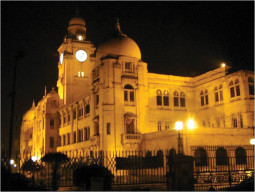
“KWSB recovers only 20 to 25 percent of its bills and it should focus on improving that,” said Sindh Governor Dr Ishratul Ebad at the inauguration of a new pumping station at Dhabeji on Thursday. “Maybe it can adopt the models, which other corporations are using,” he added.
For quite some time, KWSB has been mulling over the idea of outsourcing its bill recovery operation to private contractors, replicating the system used by the Karachi Electric Supply Company in few neighbourhoods.
More water for Karachi
In a year’s time, Karachi will receive 50 million gallons per day (MGD) of additional water from Dhabeji Pumping Complex.
The governor laid the foundation stone of the new pump, worth Rs1.28 billion. The project will help ease the water woes of the city, where the current shortage of 1,100 MGD has long surpassed the supply of 600 MGD.

“Karachi’s needs have increased rapidly,” said Ebad. “Planning to meet those needs was based on outdated population estimates and now the current setup is facing problems in coping with the demand.” He said that an additional supply of 260 MGD has already been approved for the K-IV project. “Right now 90 percent of sewerage is dumped in the sea and the S-III project will help stop that.”
Dhabeji Pumping Complex was constructed in 1959 and is designed to pump 648 MGD. New pumps were gradually added as the water supply from Indus River increased. But the pumps were never replaced and have lost efficiency. Right now the facility pumps around 550 MGD.
KWSB Managing Director Misbahuddin Farid said the pump will be constructed and made operational in 12 months. “Normally it takes three years to build such a facility but we have decided to work round the clock considering the water shortage.”
Published in The Express Tribune, December 22nd, 2012.




1732745394-0/Diddy-(4)1732745394-0-165x106.webp)












COMMENTS
Comments are moderated and generally will be posted if they are on-topic and not abusive.
For more information, please see our Comments FAQ